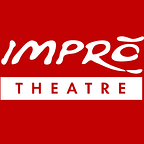How a ‘Mistake’ Led to an Improvised Podcast
By Kelly Holden Bashar
One of the basic tenets of improv is that “mistakes are gifts.” We follow this philosophy to help us turn whatever happens in the moment into the thing that was meant to be. There are no “take backs“ and everything that is offered ends up being a part of the story. A case could be made that this past year of pandemic living is a mistake that is definitely now a part of all our story.
To be clear there is obviously no silver lining or positive perspective to the devastating toll this disease has taken on the entire human race, but living in lockdown has definitely provided new opportunities.
Within a week of everything shutting down in March 2020, the amazing admin staff at Impro Theater School (where I teach narrative improv), pivoted to putting our entire curriculum online on Zoom. It was definitely a challenge — so much of improv is about being in physical space with each other and literally using our bodies, expressions, and proximity to each other as offers in the scene. But the teachers, staff and students all wanted to keep going and so, together, we figured it out. It was exciting as we played with all the bells and whistles that Zoom has to offer!
However, as Zoom fatigue started to settle in and we tried to figure out this new normal, one of the challenges that kept coming up was the different technical expertise of students and their computers. Some people could add a Snapchat filter to the Zoom like a boss and others couldn’t find the “I have a green screen” button. Some people had state of the art computers while others were using their kid’s homework computer handed down from their grandparents. While my theater company started to do Zoom shows on Twitch, where we would show off the various new technical things we had mastered, becoming a technical wiz wasn’t for everyone.
Because of this I started to do some exercises and even some longer stories where everyone turned their cameras off. The listening and enjoyment of scene work instantly increased. People talked about feeling more dropped in to the scene and, since we do longform storytelling, we could tell nice, long stories in any location or time period and not have to worry about changing Zoom backgrounds or having the right costumes.
This in turn led to me teaching and developing with our lab (the highest class level we offer at Impro) a completely improvised podcast. We developed a format where we kept cameras off and only used the visual aid of seeing whether someone was on mute as a way to signal that they were ready to speak or be in the scene. We got one suggestion from the audience based on “what is something you used to believe as a kid” and then would completely improvise a play for 25 minutes.
It was truly a game changer for me. People became so adept at signaling to each other, at using language that would help paint the pictures of where they were, and at labeling and clarifying their offers. In essence, everybody upped their game, and it made people double down on so many skills that are needed in good longform narrative improv.
I know that we are all hopeful to be back in a shared space with each other soon and I cannot wait to return to that kind of work, but one of the gifts of this time for me has been to discover that I love creating improvised podcasts. I also love the fact that you can work with improvisors who are based anywhere in the world… that is incredibly exciting to me.
Connection is what theatre is all about, and coming out of this pandemic has brought that into sharper focus for me. Audio plays are truly a creative gateway to global connection.
To check out our completely improvised podcast, called Sonder, please visit www.improvisedpodcast.com
To learn more about my new class at Impro Theatre, Improvising for Podcsats, please visit https://improtheatre.com/online-classes-impro-theatre-school/.
